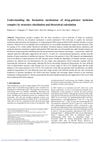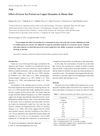 12 citations,
February 2019 in “Skin research and technology”
12 citations,
February 2019 in “Skin research and technology” White hair has less lipid content and absorbs water differently than brown hair.
38 citations,
January 2020 in “Journal of Experimental Botany” Moderate water stress helps rice form rhizosheaths by affecting hormone responses, which may aid in breeding drought-resistant rice.
 8 citations,
November 2022 in “International Journal of Cosmetic Science”
8 citations,
November 2022 in “International Journal of Cosmetic Science” Human hair varies widely and should be classified by curl type rather than race.
12 citations,
April 2015 in “BMC research notes” Root hairs in cereal crops can grow beyond the usual zone, and using Turface® clay helps study this.
 30 citations,
April 2021 in “The Journal of Sexual Medicine”
30 citations,
April 2021 in “The Journal of Sexual Medicine” Testosterone therapy can help postmenopausal women with low sexual desire if monitored carefully.
 September 2018 in “Cosmetics”
September 2018 in “Cosmetics” Inositol and arginine solutions improve hair follicle health and turnover.
 20 citations,
July 1990 in “Journal of the American Academy of Dermatology”
20 citations,
July 1990 in “Journal of the American Academy of Dermatology” Captopril may cause hair loss, as shown by a woman's hair regrowing after stopping the medication.
 94 citations,
January 2016 in “Journal of the European Academy of Dermatology and Venereology”
94 citations,
January 2016 in “Journal of the European Academy of Dermatology and Venereology” Sensitive skin is often caused by nerve fibers and environmental factors, and can be managed with mild skincare and professional advice.
 1 citations,
July 2023 in “Foods”
1 citations,
July 2023 in “Foods” Mushrooms offer benefits for food, energy, and water security, and have potential uses in health and environmental applications.
 June 2024 in “ChemBioChem”
June 2024 in “ChemBioChem” Replenishing free 18-MEA can help restore damaged hair surfaces.

Water and fatty acids affect hair's surface differently based on hair damage, and models can help understand hair-cosmetic interactions.

Sensory neuron remodeling and Merkel-cell changes happen independently during skin maintenance.

Sensory neuron changes and Merkel-cell changes in the skin happen independently during normal skin maintenance.

Sensory neurons and Merkel cells remodel at different rates during normal skin maintenance.

Sensory neuron and Merkel cell changes in the skin happen independently during normal skin maintenance.
56 citations,
April 2019 in “The Plant Journal” Cyclic nucleotide-gated channels are crucial for proper root hair growth and calcium balance in plants.

Sensory neuron remodeling and Merkel-cell changes in the skin happen independently.

Sensory neuron and Merkel-cell changes in the skin happen independently during normal skin maintenance.

Sensory neuron and Merkel cell changes in the skin happen independently during normal skin maintenance.
 December 2023 in “Journal of molecular structure”
December 2023 in “Journal of molecular structure” Hair treatments and dehydration affect hair's lipid and protein behavior, influencing its flexibility and appearance.
 19 citations,
March 1990 in “Journal of Cardiovascular Pharmacology”
19 citations,
March 1990 in “Journal of Cardiovascular Pharmacology” Minoxidil affects rat fluid dynamics, altering pressure and circulation, improving blood flow and hair growth.
 19 citations,
April 2015 in “Developmental Dynamics”
19 citations,
April 2015 in “Developmental Dynamics” The conclusion is that skin and hair patterns are formed by a mix of cell activities, molecular signals, and environmental factors.
3 citations,
August 2022 in “Pharmaceuticals” Solidified SEDDS improve drug stability and bioavailability better than liquid SEDDS.
2 citations,
July 2023 in “Water” Tradescantia plants can effectively test for the toxicity of harmful algae.

The research found how certain drugs and polymers form stable complexes, which could help develop new pharmaceutical forms.
 4 citations,
August 2022 in “The Scientific World Journal”
4 citations,
August 2022 in “The Scientific World Journal” Merremia peltata leaf extract, particularly the bufotalinin compound, shows potential for treating hair loss.
 54 citations,
June 1985 in “American Journal of Dermatopathology”
54 citations,
June 1985 in “American Journal of Dermatopathology” Minoxidil helps grow longer, thicker hair in bald scalps of stumptailed macaques, and early treatment is more effective.
3 citations,
January 2020 in “The journal of investigative dermatology/Journal of investigative dermatology” Skin cells from people with Epidermolysis Bullosa Simplex have abnormally placed and less active mitochondria.
 January 2013 in “Food science and technology research”
January 2013 in “Food science and technology research” Green tea extract may increase copper levels in mouse hair without affecting liver copper.
 2 citations,
April 2023 in “Pharmaceuticals”
2 citations,
April 2023 in “Pharmaceuticals” Scopolin and scopoletin from Merremia peltata leaves may help treat hair loss and showed promising results in rabbit tests.
























